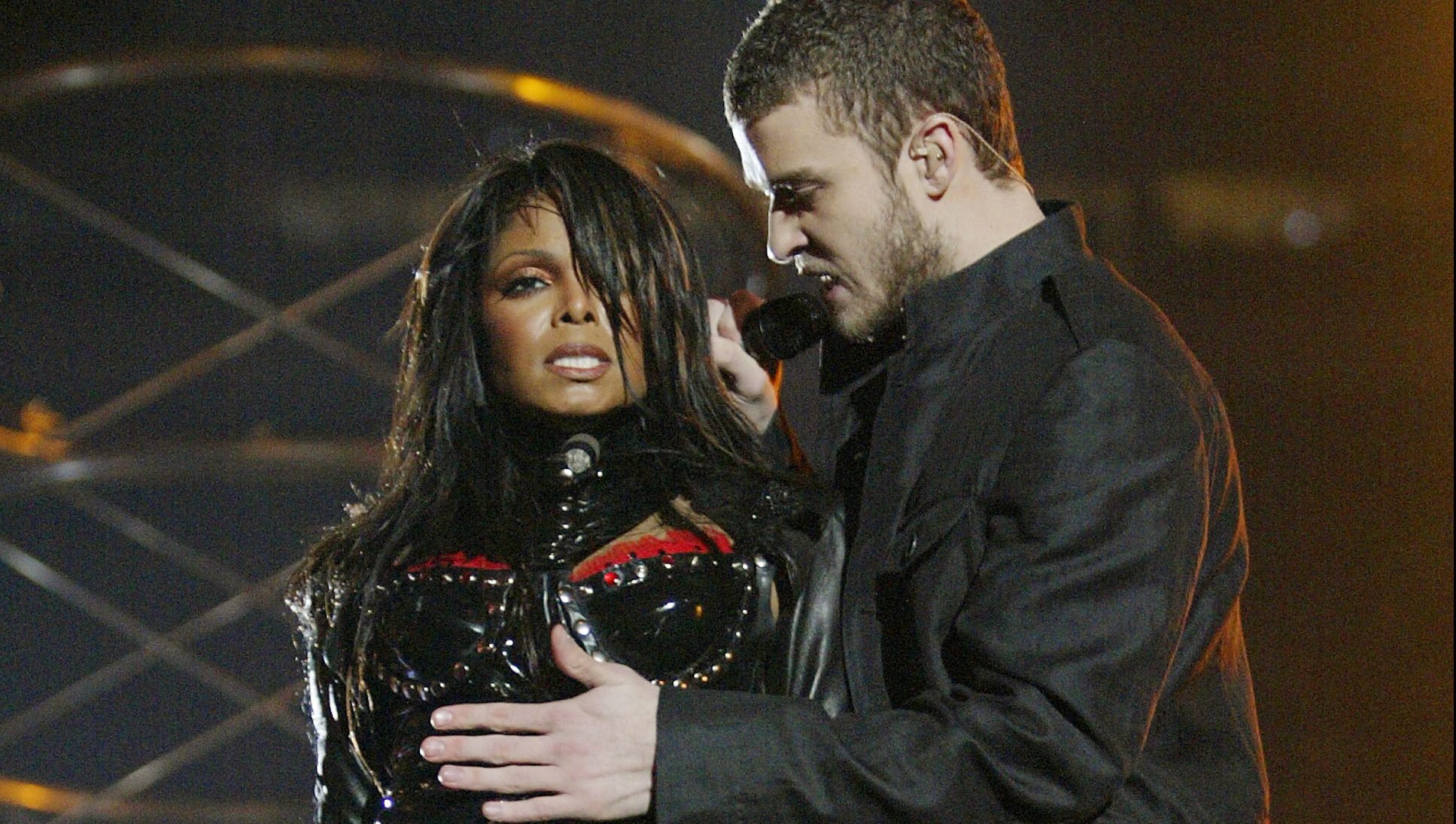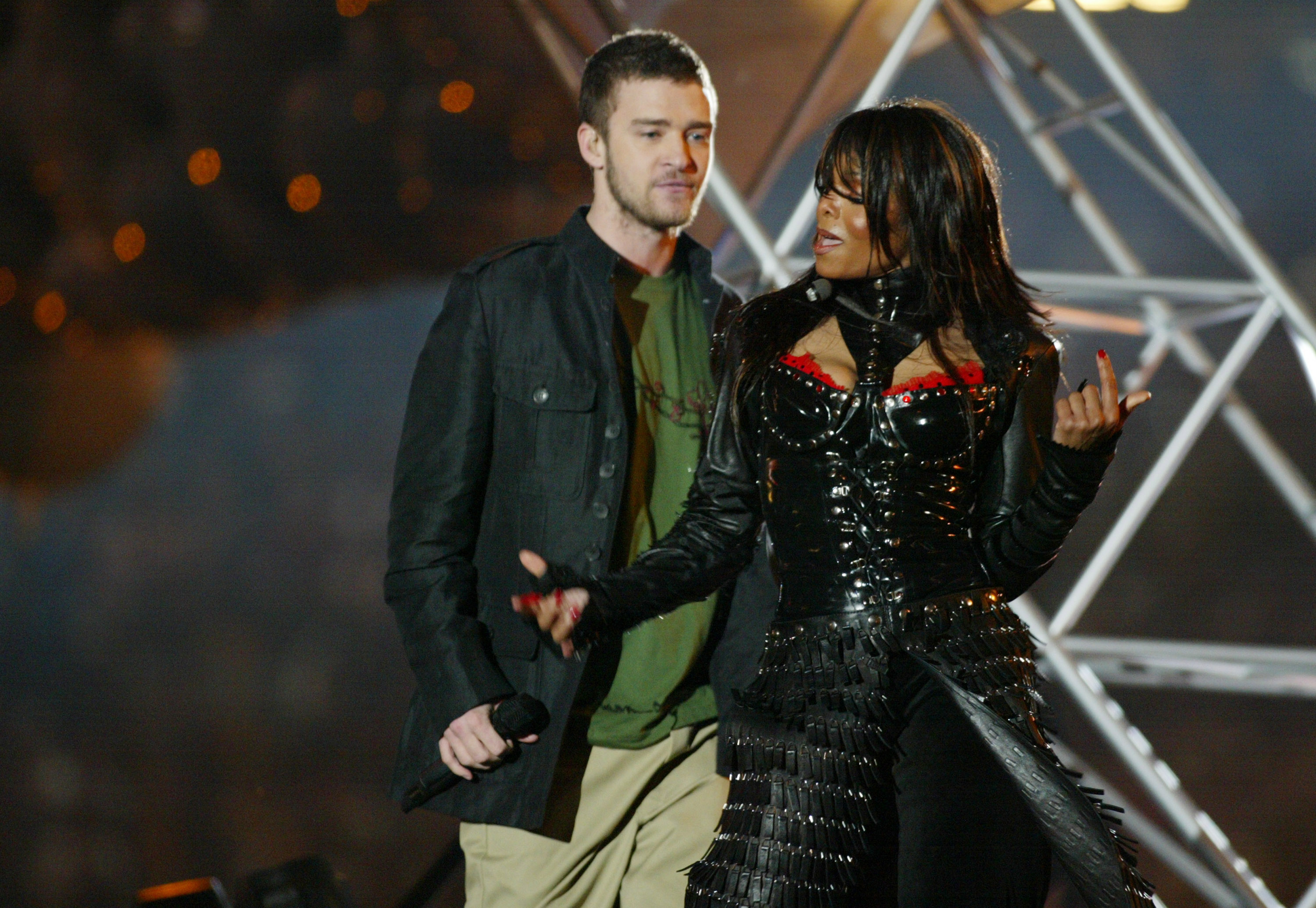

Nipplegate. Janetgate. The “wardrobe malfunction” that shook the entertainment world—and introduced the term “wardrobe malfunction” into the popular lexicon. What happened onstage during the 2004 Super Bowl Halftime show lives in infamy and had far reaching affects for at least one of the people involved. On November 19, FX and Hulu will premiere The New York Times’ latest documentary, Malfunction: The Dressing Down of Janet Jackson, which will explore “the racial and cultural currents that collided on the Super Bowl stage.”
The doc promises rare behind-the-scenes footage and interviews with executives from the NFL and MTV—the network produced the 2004 halftime show—that will hopefully shed new light on what really happened when Justin Timberlake ripped part of Janet Jackson’s bustier off, exposing her nipple live on network television. Even 17 years later, it’s still unclear what actually happened, or what exactly went wrong. What we know from watching footage of the performance is this: Jackson, having just finished performing her 1989 hit “Rhythm Nation,” was joined onstage by Timberlake. The pair performed Timberlake’s “Rock Your Body.” At the climax of the show, just as he delivered the lyric “Gotta have you naked by the end of this song,” Timberlake reaches across Jackson and rips away the right cup of her rubber Alexander McQueen bustier, exposing her right breast.
Jackson’s team later claimed that Timberlake was meant to pull away only the rubber part of the costume, revealing a red lace bra underneath. In a statement, MTV called the incident “unrehearsed, unplanned, completely unintentional and … inconsistent with assurances we had about the content of the performance.” And Jackson issued an apology the following day, seeming to absolve MTV of responsibility for the incident: “The decision to have a costume reveal at the end of my halftime show performance was made after final rehearsals. MTV was completely unaware of it. It was not my intention that it go as far as it did. I apologize to anyone offended—including the audience, MTV, CBS and the NFL.”
Amanda Ann Klein, author of Millennials Killed the Video Star: MTV’s Transition to Reality Programming, is skeptical of the idea that MTV wouldn’t have known about the reveal. “There was nothing, I think, casual about Nipplegate,” she told me recently, comparing the incident, which aired on CBS, to one that happened a few years prior at the 1999 MTV Video Music Awards, when Diana Ross jiggled Lil Kim’s pastie covered breast onstage. “It’s so interesting, this expectation of something scandalous, something shocking [on MTV]. And then when they tried to do it at the national level, a much bigger stage than MTV normally has, it just totally backfired,” Klein mused. “Because of course they were involved in that. Of course Justin Timberlake and Janet Jackson and MTV talked about this icky moment!”
Speculation aside, what is unquestionable is the affect the scandal had on Jackson’s career. The media coverage, public backlash and $550,000 FCC fine lead then Viacom CEO Les Moonves—who stepped down in 2018 amid accusations of sexual harassment and assault—to blacklist the singer’s work from all of the company’s networks and radio stations, which included MTV. Her invitation to appear at the 2004 Grammy Awards was initially withdrawn and she was fired from a biopic in which she was cast to play singer Lena Horne. The controversy dominated coverage of her 2004 album Damita Jo, and the Viacom blacklisting affected several subsequent albums.

The incident also had far-reaching consequences for broadcast television. Networks reassessed how far they were willing to go with sexually suggestive content as a result of the FCC’s fine against CBS, while other sporting events and awards shows retooled their own performances and half-time shows. As for MTV, according to Klein, the network’s mid-aughts reality show Laguna Beach was banned from filming in its stars’ high schools thanks to the backlash. “It had this trickle-down effect,” she recalls.
Timberlake, meanwhile, came out of Nipplegate largely unscathed, his career and reputation intact. He even went on to headline the 2018 Super Bowl halftime show. It hasn’t been until recently that we, as a culture, have begun to reevaluate the double standard applied to Timberlake and Jackson in the wake of their infamous Super Bowl appearance. Even before another recent FX/New York Times doc, Framing Britney Spears, revisited the role Timberlake played in coloring the media coverage of his break-up with Spears in the early 2000s, there was a growing sense within the media that he had gotten off too easily when it came to Nipplegate. The fact that a Black woman bore the lion’s share of the blame and consequences while a white man got off seemingly scot-free continues to rankle. Timberlake issued an apology to both Jackson and Spears after Framing Britney Spears aired.
In 2019, Jackson was inducted into the Rock & Roll Hall of Fame. In her acceptance speech she spoke about her determination to impact popular culture on her own terms and urged the Rock & Roll Hall of Fame to induct more women. To fans, it felt like a moment of triumph that was years in the making. Perhaps Malfunction will similarly provide long overdue vindication.














